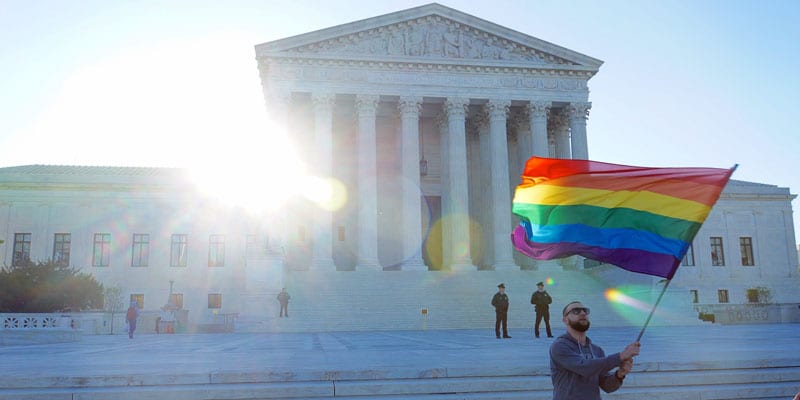
The U.S. Supreme Court heard oral arguments on Tuesday for three cases considering whether current federal civil rights laws protect LGBTQ people in the workplace.
Two of the cases (Zarda v. Altitude Express and Bostock v. Clayton County) involve the firing of gay men and question whether anti-gay discrimination is illegal under Title VII of the Civil Rights Act of 1964.
The third case, EEOC v. Harris Funeral Homes, looks for resolution on whether anti-transgender discrimination is illegal under the law.
The basic premise of the arguments hinges on whether discrimination based on “sex” – which Title VII prohibits – includes any discrimination involving sexual orientation.
In other words, are employers allowed to discriminate against an employee based on the sex of the person they may date or marry?
Conservative Justice Samuel Alito seemed to take the position that Congress in 1964 did not foresee covering sexual orientation or gender identity when passing Title VII.
“You’re trying to change the meaning of ‘sex,’” said Alito according to the Associated Press.
But Justice Elena Kagan suggested ‘sexual orientation’ is clearly a subset of sex discrimination in that a man who loves other men shouldn’t be treated differently by an employer than a woman who loves men.
Here are the immediate reactions by some reporters who attended the oral arguments.
Chris Johnson, of the Washington Blade, tweets that the ruling could come down, surprisingly, on Justice Neil Gorsuch who asked several questions “if sex is also in play” in cases regarding anti-LGBTQ discrimination.
Johnson also felt that Chief Justice John Roberts, who has become something of the ‘moderate/swing vote’ on the court since the retirement of Anthony Kennedy, should not be counted on to rule in our favor.
Gorsuch, a textualist, asked many Qs about if “sex is also in play” in cases of anti-LGBT discrimination.
To be sure, Gorsuch also asked Qs about whether employers could keep sex-segregated bathrooms under LGBT-inclusive Title VII.
— Chris Johnson (@chrisjohnson82) October 8, 2019
Gorsuch was the only justice U.S. Solicitor General Noel Francisco address during his time.
Perhaps Francisco sensed Gorsuch would come down on the side opposite of the anti-LGBT view of the Trump administration.
— Chris Johnson (@chrisjohnson82) October 8, 2019
Justice Kavanaugh was very quiet during the Title VII arguments. It’s hard to tell what he’s thinking.
He asked only one technical legal question about the plain vs. ordinary meaning of the statute.
— Chris Johnson (@chrisjohnson82) October 8, 2019
Justice Alito was obsessed with this hypothetical about an employer refusing to hire a job applicant after learning they’re gay, but not knowing their sex.
To him, that hypothetical shows anti-gay discrimination isn’t sex discrimination.
— Chris Johnson (@chrisjohnson82) October 8, 2019
Legal blogger Amy Howe, formerly of SCOTUS Blog, also came away thinking Gorsuch could be a surprise swing vote.
#SCOTUS finished with oral arguments on whether federal civil rights laws protect LGBT employees. Justices are closely divided; decision could hinge on Justice Neil Gorsuch, who acknowledged that question is “close” but also expressed concern about “massive social upheaval.”
— Amy Howe (@AHoweBlogger) October 8, 2019
Steven Mazie at The Economist felt Roberts and Gorsuch seemed ‘sensitive’ to both sides but will probably rule against Title VII protecting LGBTQ people.
He also noted Gorsuch’s comment suggesting “judicial modesty” would dictate ruling against LGBTQs due to possible “massive social upheaval” that might occur if Title VII were found to protect queer people in the workplace.
Gorsuch said it was a close textual case, but suggested that “judicial modesty“ militates against sparking an “upheaval“ in the definition of sex discrimination. A signal of the concurrence he may have already written in his mind?
— Steven Mazie (@stevenmazie) October 8, 2019
And from Mark Joseph Stern at Slate:
Gorsuch claimed that interpreting Title VII to protect LGBTQ employees will cause “massive social upheaval.” He gestured toward open-mindedness on the textual argument but I think he will vote against LGBTQ rights.
— Mark Joseph Stern (@mjs_DC) October 8, 2019
Gorsuch seemed ambivalent, but said that “when a case is really close on the textualist evidence,” the court should refuse to work “a drastic change in this country.” I think he will cast an anti-LGBTQ vote and claim judicial modesty.
— Mark Joseph Stern (@mjs_DC) October 8, 2019
Kavanaugh asked one question: Whether the anti-LGBTQ side was “drawing a distinction between the literal and ordinary meaning” of discrimination “because of sex.”
I’m not sure he has made up his mind. I suspect that when he does, he will side against LGBTQ rights.
— Mark Joseph Stern (@mjs_DC) October 8, 2019
Anyway I think the court will reject the argument for LGBTQ equality by a 5–4 vote, with the five conservatives claiming judicial modesty and saying Congress has to deal with this.
But I wouldn’t say there’s NO cause for hope. It was not a wipeout for LGBTQ rights by any means.
— Mark Joseph Stern (@mjs_DC) October 8, 2019
Currently, only 21 states, the District of Columbia, and two territories, Guam and Puerto Rico, have laws banning bias in the workplace based on both sexual orientation and gender identity.

